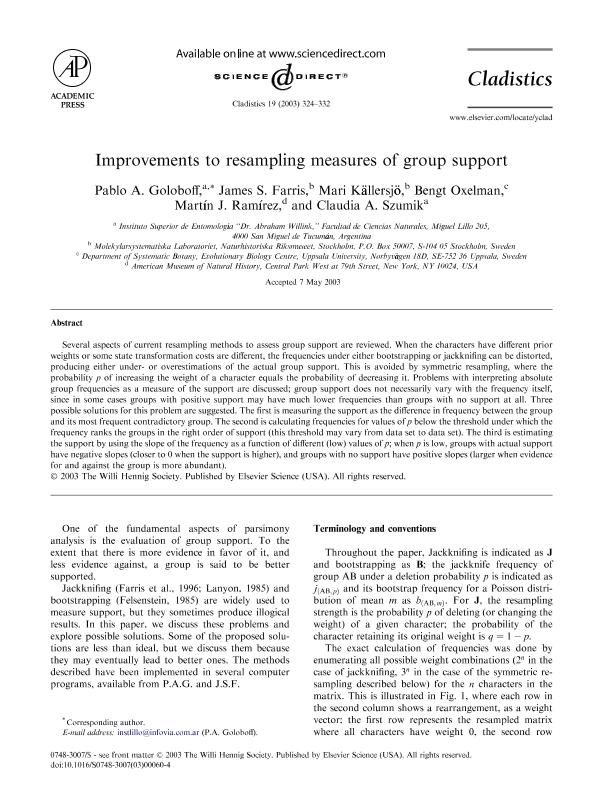Mostrar el registro sencillo del ítem
dc.contributor.author
Goloboff, Pablo Augusto

dc.contributor.author
Farris, James
dc.contributor.author
Kallersjo, Mari
dc.contributor.author
Oxelman, Bengt
dc.contributor.author
Ramirez, Martin
dc.contributor.author
Szumik, Claudia Adriana

dc.date.available
2020-03-27T14:37:43Z
dc.date.issued
2003-12
dc.identifier.citation
Goloboff, Pablo Augusto; Farris, James; Kallersjo, Mari; Oxelman, Bengt; Ramirez, Martin; et al.; Improvements to resampling measures of group support; Wiley Blackwell Publishing, Inc; Cladistics; 19; 4; 12-2003; 324-332
dc.identifier.issn
0748-3007
dc.identifier.uri
http://hdl.handle.net/11336/101057
dc.description.abstract
Several aspects of current resampling methods to assess group support are reviewed. When the characters have different prior weights or some state transformation costs are different, the frequencies under either bootstrapping or jackknifing can be distorted, producing either under‐ or overestimations of the actual group support. This is avoided by symmetric resampling, where the probability p of increasing the weight of a character equals the probability of decreasing it. Problems with interpreting absolute group frequencies as a measure of the support are discussed; group support does not necessarily vary with the frequency itself, since in some cases groups with positive support may have much lower frequencies than groups with no support at all. Three possible solutions for this problem are suggested. The first is measuring the support as the difference in frequency between the group and its most frequent contradictory group. The second is calculating frequencies for values of p below the threshold under which the frequency ranks the groups in the right order of support (this threshold may vary from data set to data set). The third is estimating the support by using the slope of the frequency as a function of different (low) values of p; when p is low, groups with actual support have negative slopes (closer to 0 when the support is higher), and groups with no support have positive slopes (larger when evidence for and against the group is more abundant).
dc.format
application/pdf
dc.language.iso
eng
dc.publisher
Wiley Blackwell Publishing, Inc

dc.rights
info:eu-repo/semantics/openAccess
dc.rights.uri
https://creativecommons.org/licenses/by-nc-sa/2.5/ar/
dc.subject
resampling methods
dc.subject
frequency
dc.subject
slope of frequency
dc.subject
abundance
dc.subject.classification
Zoología, Ornitología, Entomología, Etología

dc.subject.classification
Ciencias Biológicas

dc.subject.classification
CIENCIAS NATURALES Y EXACTAS

dc.title
Improvements to resampling measures of group support
dc.type
info:eu-repo/semantics/article
dc.type
info:ar-repo/semantics/artículo
dc.type
info:eu-repo/semantics/publishedVersion
dc.date.updated
2020-03-25T14:38:39Z
dc.journal.volume
19
dc.journal.number
4
dc.journal.pagination
324-332
dc.journal.pais
Reino Unido

dc.journal.ciudad
Londres
dc.description.fil
Fil: Goloboff, Pablo Augusto. Consejo Nacional de Investigaciones Científicas y Técnicas. Centro Científico Tecnológico - Tucumán. Unidad Ejecutora Lillo; Argentina
dc.description.fil
Fil: Farris, James. Naturhistoriska Riksmuseet; Suecia
dc.description.fil
Fil: Kallersjo, Mari. Naturhistoriska Riksmuseet; Suecia
dc.description.fil
Fil: Oxelman, Bengt. Uppsala Universitet; Suecia
dc.description.fil
Fil: Ramirez, Martin. American Museum of Natural History; Estados Unidos
dc.description.fil
Fil: Szumik, Claudia Adriana. Consejo Nacional de Investigaciones Científicas y Técnicas. Centro Científico Tecnológico - Tucumán. Unidad Ejecutora Lillo; Argentina
dc.journal.title
Cladistics

dc.relation.alternativeid
info:eu-repo/semantics/altIdentifier/doi/https://dx.doi.org/10.1016/S0748-3007(03)00060-4
dc.relation.alternativeid
info:eu-repo/semantics/altIdentifier/url/https://onlinelibrary.wiley.com/doi/abs/10.1111/j.1096-0031.2003.tb00376.x
Archivos asociados
